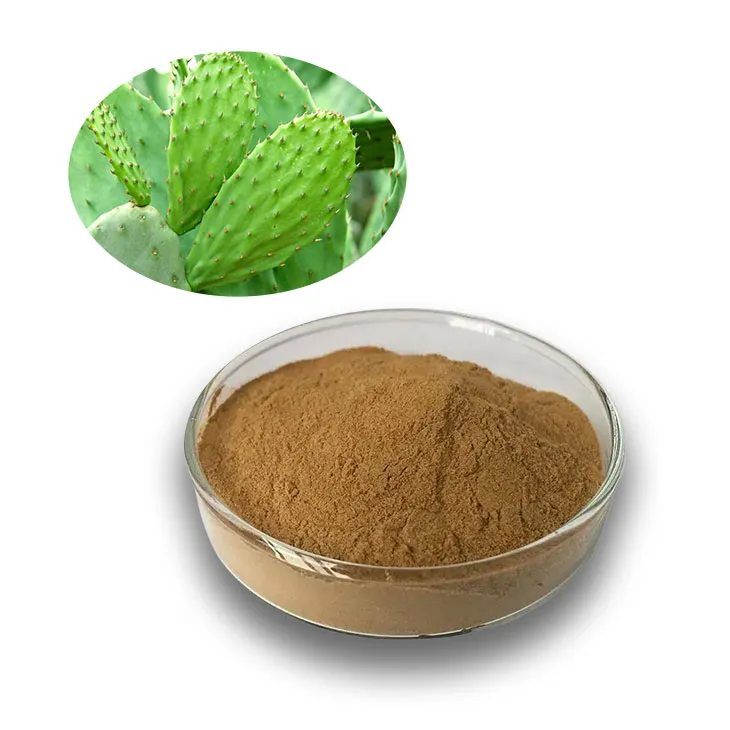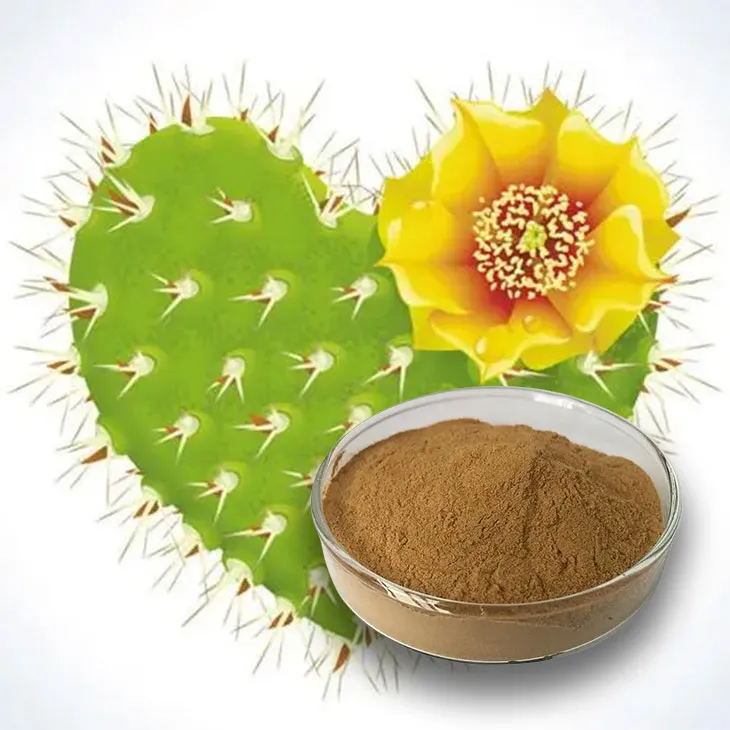- 0086-571-85302990
- sales@greenskybio.com
Cactus Extract: Benefits, Uses and Possible Side Effects
2024-11-13

1. Introduction
Cacti are known for their ability to survive in harsh and arid environments. However, in recent years, Cactus Extract has been making waves not just for the plant's hardiness but also for its potential health and beauty benefits. This extract has a wide range of properties that have led to its exploration in various industries, from skincare to traditional medicine. But as with any natural product, it is important to understand both its advantages and possible drawbacks.

2. Benefits of Cactus Extract
2.1 Antioxidant Properties
Cactus Extract is rich in antioxidants. Antioxidants play a crucial role in the body by neutralizing free radicals. Free radicals are unstable molecules that can cause damage to cells, leading to various health problems such as premature aging, cancer, and heart disease. The antioxidants in cactus extract, such as flavonoids and phenolic compounds, can help prevent this damage. For example, in a study, it was found that certain compounds in cactus extract were able to scavenge free radicals more effectively than some common synthetic antioxidants.
2.2 Anti - inflammatory Effects
Another significant benefit of cactus extract is its anti - inflammatory properties. Inflammation is a natural response of the body to injury or infection, but chronic inflammation can be harmful. Cactus extract can help reduce inflammation in the body. It may be beneficial for conditions such as arthritis, where inflammation in the joints causes pain and reduced mobility. Research has shown that the anti - inflammatory effects of cactus extract are mediated through various mechanisms, including the modulation of certain inflammatory mediators in the body.
2.3 Skin Health Benefits
- Cactus extract has been used in skincare for several reasons. It has moisturizing properties, which can help keep the skin hydrated. This is especially important for people with dry skin.
- It also contains compounds that can promote collagen production. Collagen is a protein that gives the skin its elasticity and firmness. As we age, collagen production decreases, leading to wrinkles and sagging skin. By promoting collagen production, cactus extract can help maintain a youthful appearance.
- Furthermore, its antioxidant and anti - inflammatory properties can protect the skin from damage caused by environmental factors such as UV radiation and pollution. This can prevent skin aging, reduce the appearance of blemishes, and improve overall skin health.
2.4 Potential Benefits in Diabetes Management
Some research suggests that cactus extract may have a role in diabetes management. It may help regulate blood sugar levels. This could be due to its ability to improve insulin sensitivity or its effect on carbohydrate metabolism. However, more research is needed to fully understand the mechanisms involved and to determine its effectiveness as a complementary treatment for diabetes.

3. Uses of Cactus Extract
3.1 In Skincare Products
- Cactus extract is a popular ingredient in moisturizers. Its hydrating properties make it an ideal component for products designed to keep the skin soft and supple.
- It is also used in anti - aging creams. The collagen - promoting and antioxidant effects can help reduce the signs of aging, such as fine lines and wrinkles.
- Some facial masks also contain cactus extract. These masks can provide a concentrated dose of the extract's beneficial properties, leaving the skin refreshed and rejuvenated.
3.2 In Traditional Medicine
- In traditional medicine, cactus has been used for various purposes. In some cultures, it has been used to treat digestive problems. For example, it may be used to relieve indigestion or stomach cramps.
- It has also been used topically to treat skin wounds and burns. The anti - inflammatory and antibacterial properties of cactus extract can help promote wound healing and prevent infection.
- Some traditional medicine practitioners may use cactus extract to treat respiratory conditions, although more scientific research is needed to validate these uses.
3.3 In Dietary Supplements
Cactus extract is available in the form of dietary supplements. These supplements are often marketed for their potential health benefits, such as antioxidant support and blood sugar regulation. However, it is important to note that the regulation of dietary supplements varies by country, and consumers should be cautious when choosing and using these products.

4. Potential Side Effects of Cactus Extract
4.1 Allergic Reactions
Some people may be allergic to cactus extract. Allergic reactions can range from mild symptoms such as skin rashes, itching, and redness to more severe reactions like difficulty breathing and swelling of the face, lips, or tongue. If you have a known allergy to cacti or related plants, it is best to avoid using products containing cactus extract.
4.2 Gastrointestinal Disturbances
- When taken orally, cactus extract may cause gastrointestinal disturbances in some individuals. This can include symptoms such as nausea, vomiting, diarrhea, or abdominal pain.
- The exact cause of these symptoms is not fully understood, but it may be related to the composition of the extract or individual sensitivities.
4.3 Interaction with Medications
There is a possibility that cactus extract may interact with certain medications. For example, if you are taking medications for diabetes or blood pressure, it is important to consult your healthcare provider before using cactus extract supplements. The extract may potentiate or interfere with the effects of these medications, potentially leading to adverse health outcomes.
5. Conclusion
Cactus extract offers a range of potential benefits, from antioxidant and anti - inflammatory effects to applications in skincare and traditional medicine. However, it also has some potential side effects that should not be overlooked. As with any natural product, it is important to use cactus extract with caution, especially if you have underlying health conditions or are taking medications. Further research is also needed to fully explore its properties and potential applications, ensuring that it can be used safely and effectively in the future.
FAQ:
What are the main antioxidant components in cactus extract?
Cactus extract contains various substances with antioxidant properties. Some of the main components include flavonoids, polyphenols, and betalains. Flavonoids are known for their ability to scavenge free radicals and protect cells from oxidative damage. Polyphenols also play a significant role in antioxidation. Betalains, which are pigments unique to some cactus species, contribute to the antioxidant effects as well.
How is cactus extract used in skincare?
In skincare, cactus extract is used in multiple ways. It can be added to moisturizers due to its hydrating properties. The antioxidant and anti - inflammatory effects make it suitable for anti - aging products, as it helps reduce the appearance of wrinkles and fine lines. It may also be used in products for treating skin conditions like acne or eczema, as it can soothe irritated skin and reduce inflammation.
What are the potential side effects of cactus extract?
Some potential side effects of cactus extract may include allergic reactions in some individuals. Since it is a natural product, there could be cross - reactivity with other substances. Ingesting large amounts of cactus extract (if used in dietary supplements) might cause gastrointestinal discomfort such as nausea, vomiting, or diarrhea. However, these side effects are not common and vary depending on the individual and the form and concentration of the extract.
Can cactus extract be used in cooking?
Yes, cactus extract can be used in cooking in some cultures. It can add a unique flavor and color to dishes. However, not all cactus species are suitable for consumption, and it is important to ensure that the cactus used is safe and free from toxins. When using cactus extract in cooking, it is often used in small amounts to enhance the flavor profile of the dish.
How does cactus extract work as an anti - inflammatory?
Cactus extract works as an anti - inflammatory through several mechanisms. It may inhibit the production of pro - inflammatory cytokines, which are molecules that play a role in the inflammatory response. It can also interact with immune cells, modulating their activity to reduce inflammation. Additionally, the antioxidant components in cactus extract can help prevent oxidative stress, which is often associated with inflammation.
Related literature
- Antioxidant and Anti - Inflammatory Properties of Cactus Extracts"
- "Cactus Extract in Skincare: A Comprehensive Review"
- "Potential Health Benefits and Risks of Cactus - Based Supplements"
- ▶ Hesperidin
- ▶ citrus bioflavonoids
- ▶ plant extract
- ▶ lycopene
- ▶ Diosmin
- ▶ Grape seed extract
- ▶ Sea buckthorn Juice Powder
- ▶ Beetroot powder
- ▶ Hops Extract
- ▶ Artichoke Extract
- ▶ Reishi mushroom extract
- ▶ Astaxanthin
- ▶ Green Tea Extract
- ▶ Curcumin Extract
- ▶ Horse Chestnut Extract
- ▶ Other Problems
- ▶ Boswellia Serrata Extract
- ▶ Resveratrol Extract
- ▶ Marigold Extract
- ▶ Grape Leaf Extract
- ▶ blog3
-
Cranberry Plants and Skin - care Products.
2024-11-13
-
Aguaje Extract
2024-11-13
-
Coconut Water Powder
2024-11-13
-
Kelp Extract Powder
2024-11-13
-
Uridine-5'-monophosphate Disodium salt
2024-11-13
-
Resveratrol extract
2024-11-13
-
Propolis Extract Powder
2024-11-13
-
Maitake Mushroom Extract
2024-11-13
-
Calendula Extract
2024-11-13
-
Aminolevulinic acid
2024-11-13
-
Bilberry Extract
2024-11-13





















